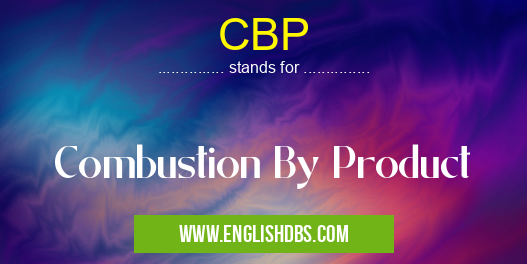What does CBP mean in UNCLASSIFIED
CBP stands for Combustion By Product. It refers to the substances produced during the combustion process, which involves the rapid reaction of a substance with oxygen, releasing heat and light.

CBP meaning in Unclassified in Miscellaneous
CBP mostly used in an acronym Unclassified in Category Miscellaneous that means Combustion By Product
Shorthand: CBP,
Full Form: Combustion By Product
For more information of "Combustion By Product", see the section below.
Types of Combustion By Products
- Gases: Carbon dioxide (CO2), carbon monoxide (CO), nitrogen oxides (NOx), and sulfur oxides (SOx)
- Particulates: Ash, soot, and dust
- Liquids: Water vapor and unburned hydrocarbons
- Solids: Char and slag
Sources of Combustion By Products
- Power plants
- Industrial processes
- Vehicles
- Residential heating and cooking
Environmental Impact of Combustion By Products
Combustion by products can have significant environmental impacts:
- Greenhouse gas emissions: CO2 contributes to global warming
- Air pollution: NOx and SOx can cause respiratory problems and acid rain
- Climate change: CO2 and other greenhouse gases trap heat in the atmosphere
- Health hazards: Particulate matter and CO can cause cardiovascular and respiratory diseases
Regulations and Mitigation
To mitigate the environmental impact of combustion by products, regulations and technologies are employed:
- Emission standards: Limits on the amount of pollutants released into the air
- Pollution control technologies: Scrubbers, catalytic converters, and electrostatic precipitators
- Renewable energy sources: Reducing reliance on fossil fuels
- Energy efficiency measures: Minimizing energy consumption
Essential Questions and Answers on Combustion By Product in "MISCELLANEOUS»UNFILED"
What are Combustion By Products (CBPs)?
Combustion By Products (CBPs) are substances released into the environment as a result of combustion processes, such as the burning of fossil fuels. Common CBPs include particulate matter, sulfur dioxide, nitrogen oxides, carbon monoxide, and volatile organic compounds.
What are the health effects of CBPs?
Exposure to CBPs can have various adverse health effects, including respiratory problems, cardiovascular disease, cancer, and neurological damage. Particulate matter, for example, can irritate the lungs and airways, while nitrogen oxides can contribute to the formation of ozone, which is a lung irritant. Long-term exposure to CBPs can also increase the risk of chronic diseases such as asthma, bronchitis, and emphysema.
How can I reduce my exposure to CBPs?
There are several ways to reduce exposure to CBPs:
- Use cleaner fuels or alternative energy sources in vehicles and appliances.
- Use energy-efficient devices and appliances.
- Avoid burning fossil fuels for heating or cooking.
- Ventilate indoor spaces properly to reduce the accumulation of CBPs.
- Participate in community efforts to improve air quality, such as supporting clean energy initiatives and reducing traffic congestion.
What are the environmental impacts of CBPs?
CBPs also have significant environmental impacts:
- Sulfur dioxide and nitrogen oxides contribute to acid rain, which damages forests, lakes, and buildings.
- Particulate matter can reduce visibility and contribute to climate change by absorbing solar radiation.
- Nitrogen oxides can also contribute to the formation of smog, which can impair air quality and harm vegetation.
What are governments doing to reduce CBPs?
Governments around the world have implemented various regulations and policies to reduce CBPs, including:
- Setting emission standards for vehicles, industries, and power plants.
- Promoting renewable energy and energy efficiency.
- Supporting research and development of cleaner technologies.
- Encouraging public transportation and walking/biking as alternatives to driving.
Final Words: CBP (Combustion By Product) represents the substances produced during the combustion process. These by products have significant environmental impacts, including air pollution, climate change, and health hazards. Regulations and mitigation efforts are crucial to control their emissions and protect human health and the environment.
CBP also stands for: |
|
| All stands for CBP |
